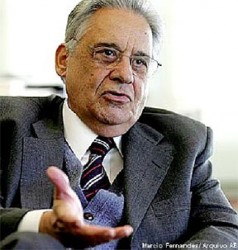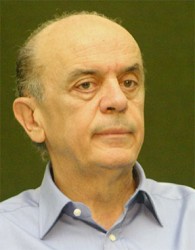Brazilian President Dilma Rousseff’s political troubles are growing by the day following a March 15 anti-government protest that drew much bigger crowds than expected — about 1.5 million people nationwide — and new corruption charges against key members of her ruling Workers Party.
 Judging from what I heard from former President Fernando Henrique Cardoso, Sen Jose Serra and other leading Brazilian politicians when I interviewed them this week, Rousseff may not be impeached — at least for now — in the political scandal over the more than $800 million in bribes paid to government officials and legislators of the ruling Workers Party.
Judging from what I heard from former President Fernando Henrique Cardoso, Sen Jose Serra and other leading Brazilian politicians when I interviewed them this week, Rousseff may not be impeached — at least for now — in the political scandal over the more than $800 million in bribes paid to government officials and legislators of the ruling Workers Party.
But Rousseff may be politically paralyzed for the remainder of her term, which ends in January 2019. The investigation into the state-run Petrobras oil company’s kickbacks to leading politicians while she was a member of the Petrobras board is likely to stretch for one or two years. By the time it ends — assuming that she emerges unscathed — she will be a lame-duck president.
To make things worse, Brazil’s economy will have its worst performance in 25 years this year, according to a recent Central Bank survey of leading economists, which projected a 0.6 per cent contraction of the economy in 2015. Few economists expect a major economic turnaround in coming years, barring an unlikely move by Rousseff to reach out to the opposition and approve key economic reforms.

Henrique Cardoso

Earlier this week, a Datafolha poll showed that only 13 per cent of Brazilians think that Rousseff is doing a good job, the worst rating of any Brazilian president in more than two decades. A 62 per cent majority say her performance is “bad” or “terrible,” the poll says.
“Without a doubt, last weekend’s protests will have a big impact,” opposition Sen Jose Serra told me. “We had never seen anything quite like it. There weren’t political parties, or unions behind the protests. And people took to the streets anyway.”
Indeed, 74 per cent of those who protested in Sao Paulo participated for the first time in a political rally.
When I asked former President Cardoso what’s new about last weekend’s protests, considering that there were massive anti-government demonstrations in 2013 and 2014, he said that the combination of growing public “indignation” against the government, Rousseff’s record low popularity rates, an ailing economy, and the continuing investigation into the Petrobras corruption scandal will undoubtedly have a political impact.
“You see that in the fact that the Congress, which listens to public opinion, is starting to become more rebellious. So, yes, there will be political consequences,” Cardoso said.
Asked whether he thinks that Rousseff will be impeached, Cardoso said that congressional leaders rightfully tend to see an impeachment as a measure of last resort because they don’t want to further divide the country and put democracy at risk. But if the prosecutors establish a direct link between the Petrobras bribes and Rousseff, an impeachment is possible, he added.
Cardoso said that he still believes that neither former President Luiz Inácio Lula da Silva nor Russeff were “directly involved” in the Petrobras scandal, but added that “it’s impossible that President Lula and her didn’t know that something bad was happening there.”
Following the latest anti-government protests, Rousseff vowed to announce a plan to fight corruption “with all weapons available.” She added that the fact that the treasurer of the ruling Workers’ Party was charged by prosecutors this week shows that her government is “not interfering” with the investigation, and that Brazil continues to be a country with strong checks and balances.
My opinion: To her credit, and despite her government’s economic populism and horrendous foreign policy— which almost automatically sides with the world’s worst human rights abusers — Rousseff has fired more than a half- dozen ministers because of corruption allegations during her first term.
That sets her apart from the presidents of Argentina or Venezuela, for instance, who not only fail to fire but often promote and publicly support their top aides accused of massive corruption, claiming that they are victims of alleged conspiracies to destabilize their governments.
But if Rousseff wants to get Brazil back on its feet, she will have to stop governing in isolation. Times have changed, Brazil is no longer benefiting from record world commodity prices, her Workers Party is no longer as popular as it was, and Brazil badly needs a government with wider support to embark on difficult economic reforms that can draw investments. If Rousseff doesn’t invite opposition figures into her government, Brazil faces indefinite paralysis, or worse.
© The Miami Herald, 2015. Distributed by Tribune Marketing Agency.









